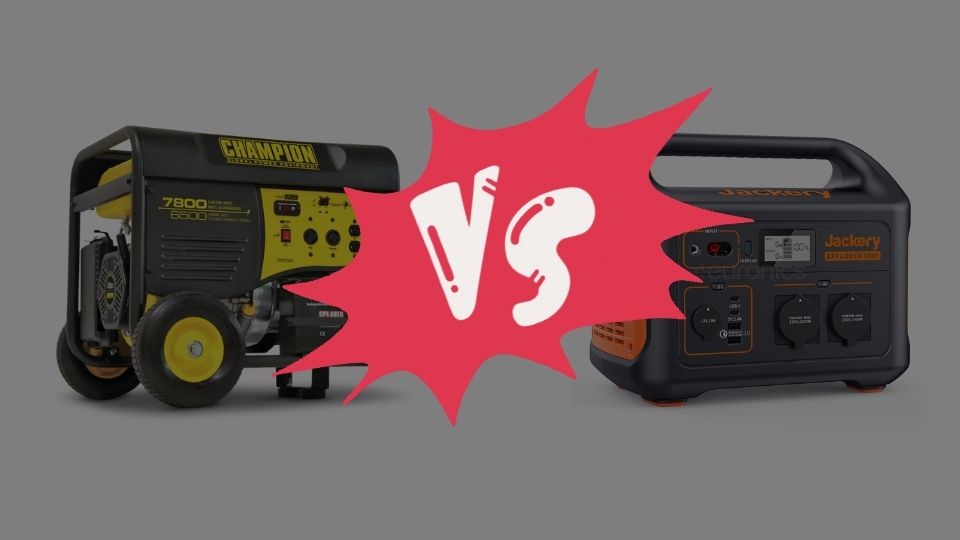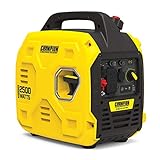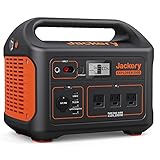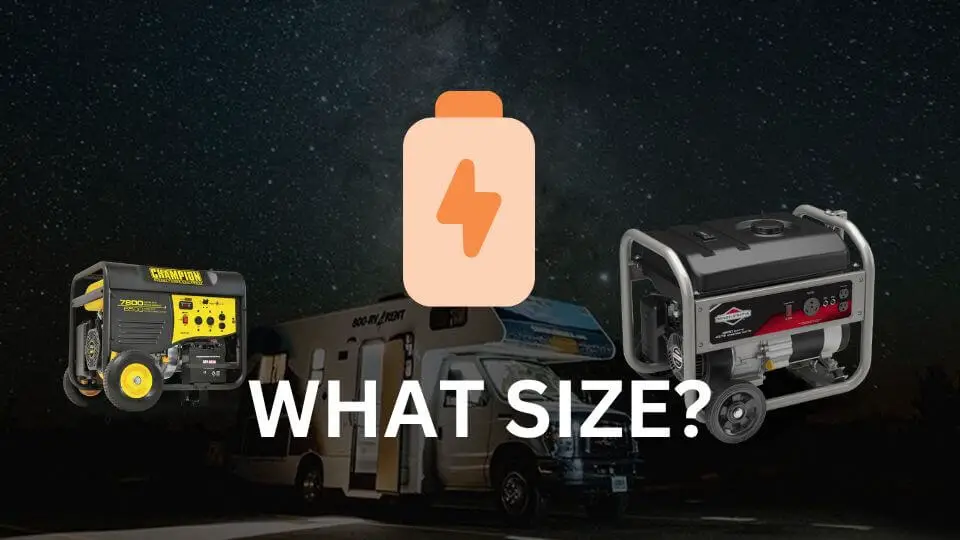This post may contain affiliate links. As an affiliate, we earn from qualifying purchases. We get commissions for purchases made through links in this post.
Portable generators and portable power stations are two popular options for consumers who require a reliable source of electricity when they are off the grid or during power outages. While both devices serve the same purpose, they differ in a number of ways. Understanding the distinctions between the two can assist you in making a wise choice regarding which one is most suitable for you.
When choosing between a portable generator and a power station, several factors need to be considered, including power demands, runtime, noise level, portability, and cost. The right choice depends on your specific needs and preferences. In the following sections, we’ll dive deeper into the differences between portable generators and power stations and help you decide which one is better for you.
What is a Portable Generator
A portable generator is a device that generates electricity by burning fuel, usually gasoline or propane. It runs as long as it has enough fuel and oil and requires periodic maintenance for it to continue running.
Portable generators have a control panel, which can feature multiple power outlets, including 15, 20, 30, or 50 amp sockets. There are also some control elements and indicators on the panel.
Portable generators are commonly used as backup power sources during power outages or as a power source for outdoor activities like camping, tailgating, and outdoor events.
- ULTRA-LIGHTWEIGHT: At only 39 pounds, this inverter is one of the lightest 2500-watt inverters in the industry.Fully assembled with hassle-free...
- QUIET OPERATION: 53 dBA from 23 feet is perfect for camping, tailgating or to backup a few home essentials, featuring 2500 starting watts, 1850...
- PARALLEL READY: The optional clip-on parallel kit enables this inverter to connect with another 2500-watt Champion inverter to double your output...
- CLEAN POWER: Includes two covered 120V 20A household outlets with clean electricity (less than 3% THD)
- Fully assembled with hassle-free setup, the built-in carrying handle makes transport a cinch.
Functionality
Portable generators work by converting mechanical energy into electrical energy. They have an internal combustion engine that rotates an alternator, which, in turn, converts the mechanical energy of rotations to the electric current. Portable generators come in different sizes and power outputs, and they can power a variety of appliances and devices. The engine is fueled by gasoline, diesel, or propane, and the generator typically has a fuel tank that can be refilled as needed.
Benefits
Portable generators are a reliable source of backup power during power outages, as they can power essential appliances like refrigerators, space heaters, microwaves, aircons, and so on. They are also useful for outdoor activities, providing power for lighting, cooking, entertainment, and climatization. Portable generators are typically less expensive than power stations, making them a more accessible option for many people.
Drawbacks
Portable generators are not as clean and quiet as power stations, and they require regular maintenance to keep them running smoothly. They also emit exhaust fumes, which can be harmful if used indoors or in poorly ventilated areas. Portable generators are also less efficient than power stations. Finally, portable generators are not as portable as power stations, as they are typically heavier and bulkier, making them more difficult to transport and store.
What is a Power Station?
A power station is a portable device that provides electricity without the need for fuel. It is a rechargeable battery-powered device that can be charged through a wall outlet, solar panel, or car battery. You can think of a power station as a power bank with a large capacity. Power stations are becoming increasingly popular due to their portability, versatility, and eco-friendliness.
- Clean and Unlimited Solar Energy: 100% green energy with smart MPPT controller for optimal charging efficiency. The power station can be fully...
- Easy to Use: The ergonomic shape of the handle grants an ease grip. And use in one touch with simple and speedy setup within 60s to enjoy...
- Safe & Reliable for Outdoor Camping: Features industry-leading cylindrical batteries (popular with manufacturers of Electric Vehicles) that meet...
- Power Pretty Much Anything: Power 90% home appliances with 1002Wh (1000W AC output power) and 8 outlets (3*AC outlet, 1*USB-A , 1*USB-A quick...
- What You Get: 1* Jackery Explorer 1000 Portable Power Station (1002Wh Portable Power Station), 1*AC Adapter, 1* Car Charger Cable, 1*SolarSaga...
Functionality
A power station works by storing energy in its battery, which can be used to power various devices. It has multiple outlets, including USB, AC, and DC, that can be used to charge or power devices such as smartphones, laptops, tablets, cameras, and even small appliances like fridges, microwaves, fans, and power tools. Some power stations come with built-in foldable solar panels that can be used to recharge the battery, making them ideal for outdoor activities such as camping, hiking, and road trips.
Benefits
One of the biggest benefits of a power station is its portability. It is lightweight and compact, making it easy to carry around. It can be used in various settings, including indoors and outdoors. Power stations are also eco-friendly, as they do not emit harmful fumes or noise like traditional generators. They are also maintenance-free, as there are no rotating parts or fuel systems. Yes, some power stations come with a built-in cooling fan, yet, it does not require maintenance throughout the lifetime of the device.
Drawbacks
One of the drawbacks of a power station is its limited power output. It may not be able to power larger appliances or tools that require a lot of energy. The charging time can also take quite a while, especially when using solar panels. Additionally, power stations can be expensive compared to traditional generators, although their eco-friendliness and versatility make them a worthwhile investment. They also degrade in time and their capacity reduces after numerous recharge cycles. Portable power stations are less reliable in the condition of extreme cold when compared to portable generators which are basically all-weather devices.
What is the difference between a power station and a power generator?
When considering portable power solutions, two primary choices are power stations and power generators. Although they share the common goal of supplying portable power, they have distinct characteristics. In the upcoming sections, we will delve into the disparities between power stations and power generators in various aspects.
Power Output
Power generators are generally more powerful than power stations. They can output up to 10kW of power, making them suitable for powering large appliances and devices. In contrast, power stations typically have a lower power output, ranging from 100W to 2kW. This makes them better suited for charging smaller devices like laptops, smartphones, and cameras, and running small appliances and tools for camping like electric blankets, fans, or lights.
Fuel Source
Power generators are powered by gasoline, propane, or diesel fuel. This means that they require a constant supply of fuel to operate, which can be a hassle if you are in an area without easy access to fuel. Power stations, on the other hand, can be charged by a variety of sources, including solar panels, wall outlets, and car chargers. This makes power stations a more versatile option, especially if you are in an area with limited access to fuel.
Portability
Power stations are generally more portable than power generators. They are typically smaller and lighter, making them easier to carry around. Additionally, some power stations come with built-in handles or shoulder straps, making them even more convenient to transport. Power generators, on the other hand, are typically larger and heavier, which makes them more difficult to move around.
Noise Level
Power generators always produce more or less noise. This is because they have an internal combustion engine that produces noise when running. Power stations, on the other hand, do not produce but rather release the electricity that they store, hence making them almost 100% quiet. When I say 100% quiet, I am taking a cooling fan into consideration. Some high-capacity power stations are equipped with a fan that cools them down to avoid damage. While that fan creates some noise, it is still much less when compared to an ICE that runs on a generator.
Reliability
Power generators are generally more reliable than power stations. This is because they have a constant source of fuel and can run for hours without needing to be recharged. Power stations, on the other hand, are more reliant on their battery life or solar panels. This means that they may not be as reliable if you are in an area with limited sunlight or if you need to use them for an extended period of time. Having said that, portable generators require maintenance, while power stations do not.
Cost
Portable generators of the same capacity are less expensive than power stations. This is because they do not include expensive lithium-ion batteries. Power stations, on the other hand, would always cost more, especially if you need a 2 or even 3kW option. Add up solar panels and you will have to spend much more on a power station compared to a generator of the same size.
Overall, the choice between a power station and a power generator will depend on your specific needs and requirements. If you need a device that is more powerful and reliable, then a power generator may be the better option. However, if you need a device that is more portable and versatile, then a power station may be the better choice.
What is Best: Power Station or Generator?
When it comes to choosing between a power station and a generator, there is no one-size-fits-all answer. Both have their unique advantages and disadvantages and what works best for one person may not be the best option for another.
Here are some factors to consider when deciding between a power station and a generator:
- Portability
If portability is your top priority, then a power station is likely the better option. Power stations are compact, lightweight, and easy to carry around. They typically come with built-in handles or straps, making them easy to transport to your camping site or outdoor activity.
On the other hand, generators are typically larger and heavier, making them more difficult to move around. They often require wheels or a cart to transport, which can make them less convenient for outdoor activities. - Power Output
If you need to power larger appliances or tools, then a generator may be the better option. Generators typically have a higher power output than power stations, and they can handle more demanding loads.
However, if you only need to power small electronics like phones, laptops, and lights, then a power station will be sufficient. Power stations typically have a lower power output, but they can still provide enough power to keep your devices charged and running. - Noise
If you’re looking for a quiet power source, then a power station is your choice. Power stations create zero or very low noise levels which makes them a perfect companion for camping.
Generators, on the other hand, can be quite loud. They use an engine to generate power, which can produce a lot of noise. If you’re planning to use a generator in a residential area, you may need to check local noise ordinances to make sure you’re not disturbing your neighbors. Even the inverter generator will be much more noisier when compared to a power station. - Extreme temperatures
Power stations are less flexible when it comes to operating in high and low temperatures. In fact, they are losing capacity when operating in temperatures below 14°F and above 104°F. Generators, on the other hand, can operate under much lower temperatures, especially those running on gas, and in a bit higher temperatures as well. - Lifetime
Power stations degrade and lose capacity with each cycle of charge/discharge, which makes them much less efficient over time to the levels when they are no longer usable. Portable generators, on the other hand, will run for many years without significant efficiency reduction, given they are properly maintained. - Cost
Finally, cost is an important factor to consider when choosing between a power station and a generator. Power stations tend to be more expensive upfront, but they can save you money in the long run since you don’t need to buy fuel.
Generators, on the other hand, are typically less expensive upfront, but they require fuel to operate. Depending on how often you use your generator, the cost of fuel can add up quickly.
In summary, the best option between a power station and a generator depends on your specific needs. If you need a portable, quiet, and low-maintenance power source for small electronics, then a power station is likely the better option. If you need to power larger appliances or tools and don’t mind the noise and maintenance, then a generator may be the better choice.
How to choose between a Power Station and a Generator?
When it comes to choosing between a power station and a generator, there is no clear winner. It depends on the user’s requirements, budget, and preferences. Both devices have their pros and cons, and it is essential to analyze the scenario before making a decision.
Scenario Based Analysis
If the user needs a power source for outdoor activities like camping, hiking, or tailgating, a portable power station is a better option. Power stations are lightweight, compact, and easy to carry around. They can power small appliances like smartphones, laptops, lights, and even small appliances like fridges and microwaves. However, if the user requires a power source for heavy-duty equipment like space heaters, 12K BTU air conditioners, or electric griddles, a generator is the way to go. Generators have more power output and can run for longer durations.
Long Term Efficiency
When speaking of long-term efficiency, power stations are more cost-effective than generators. Power stations are rechargeable and can be charged using solar panels, car chargers, or wall outlets. They do not require fuel, and therefore, there are no recurring expenses. On the other hand, generators run on gasoline, propane, or diesel, and the fuel costs can add up over time. Additionally, generators require regular maintenance like oil changes, air filter replacements, and spark plug cleanings.
Safety Considerations
Safety is a crucial factor to consider when using power sources. Both power stations and generators have their safety concerns. Power stations are battery-powered, and if the battery is damaged or punctured, it can cause a fire or explosion. Therefore, it is essential to handle the battery with care and avoid exposing it to extreme temperatures or physical damage. Generators emit carbon monoxide gas, which is poisonous and can cause death if inhaled in large quantities. Therefore, it is crucial to operate generators in well-ventilated areas and avoid using them indoors.
In conclusion, the choice between a power station and a generator depends on the user’s requirements, budget, and preferences. Power stations are a better option for outdoor activities and short-term power needs, while generators are suitable for heavy-duty equipment and as a backup for an outage. Both devices have their pros and cons, and it is essential to analyze the scenario before making a decision.
Conclusion
In conclusion, both portable generators and power stations have their own unique advantages and disadvantages. It ultimately depends on the specific needs and preferences of the user.
Portable generators are generally more powerful and can provide more energy for longer periods of time, making them ideal for larger appliances and longer power outages. They also tend to be more affordable and widely available.
On the other hand, power stations are quieter, more portable, and do not emit harmful fumes, making them a safer and more environmentally friendly option. They are also easier to maintain and do not require fuel to operate.
When deciding between a portable generator and a power station, it is important to consider factors such as power output, portability, noise level, fuel source, and overall cost. It is recommended to carefully evaluate your specific needs and budget before making a decision.
Ultimately, both options can provide reliable backup power in emergency situations or for outdoor activities. It is up to the user to determine which one is the best fit for their individual needs.







